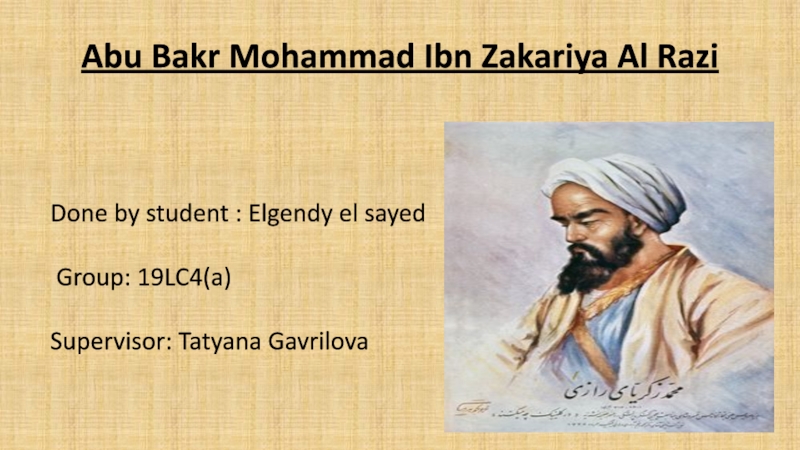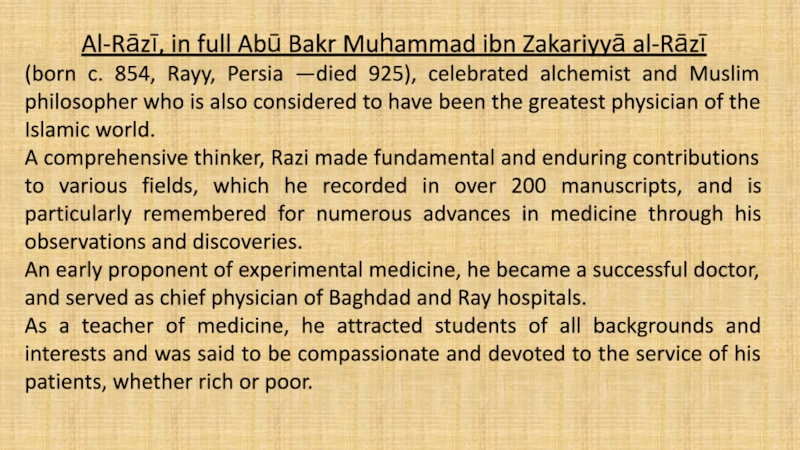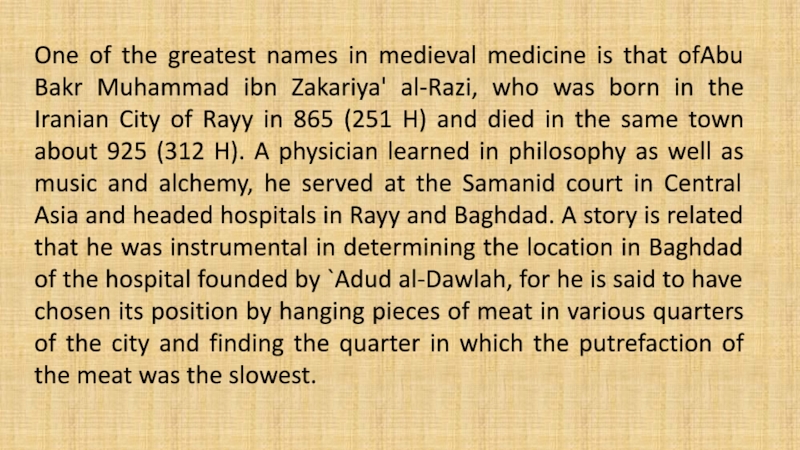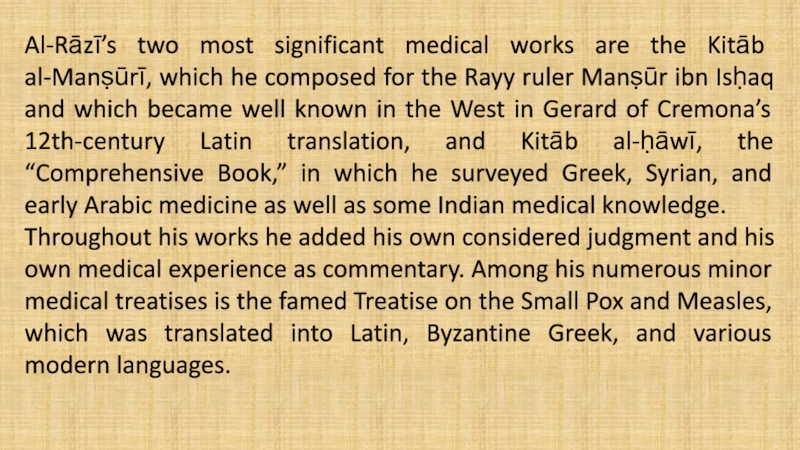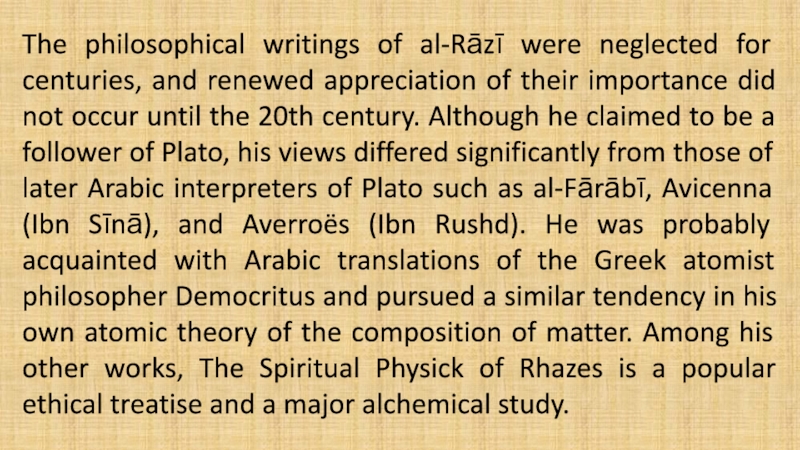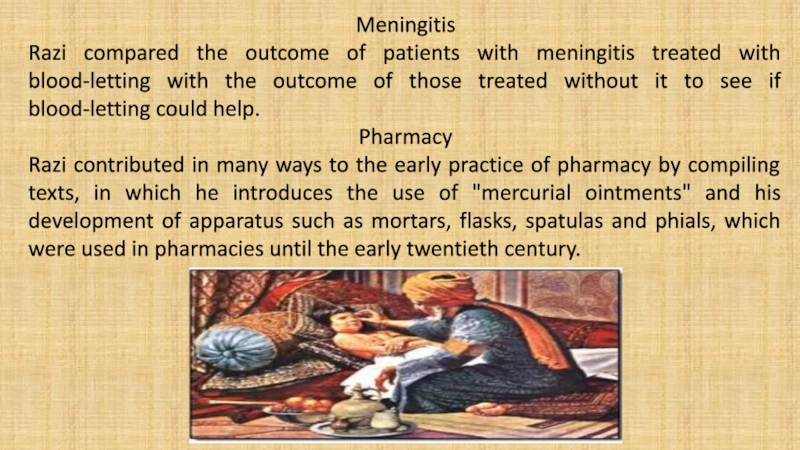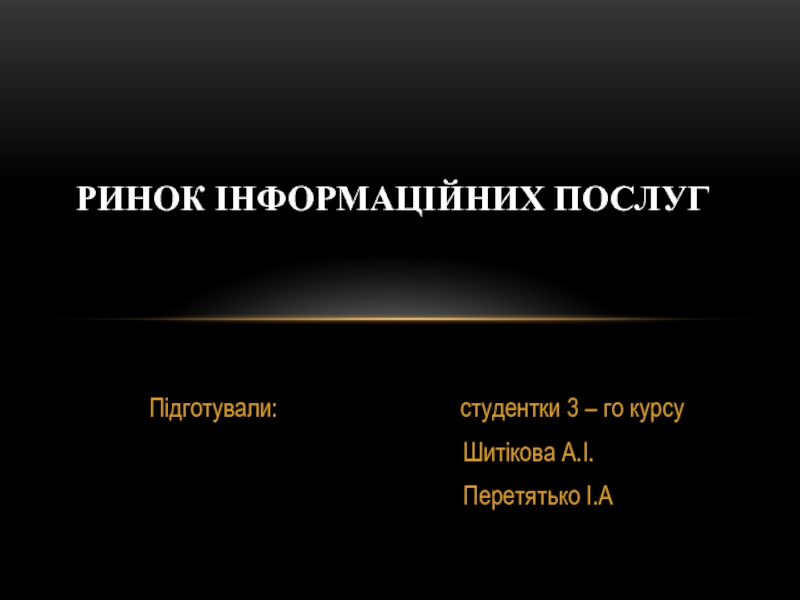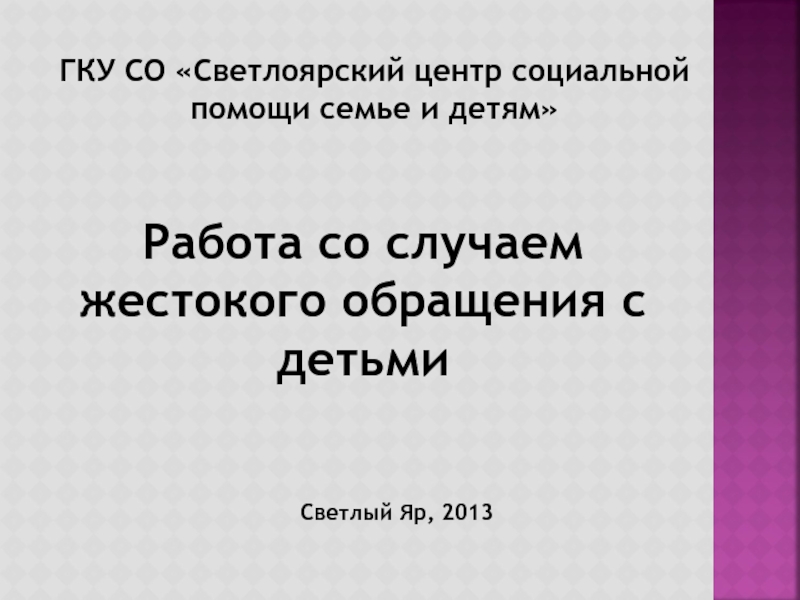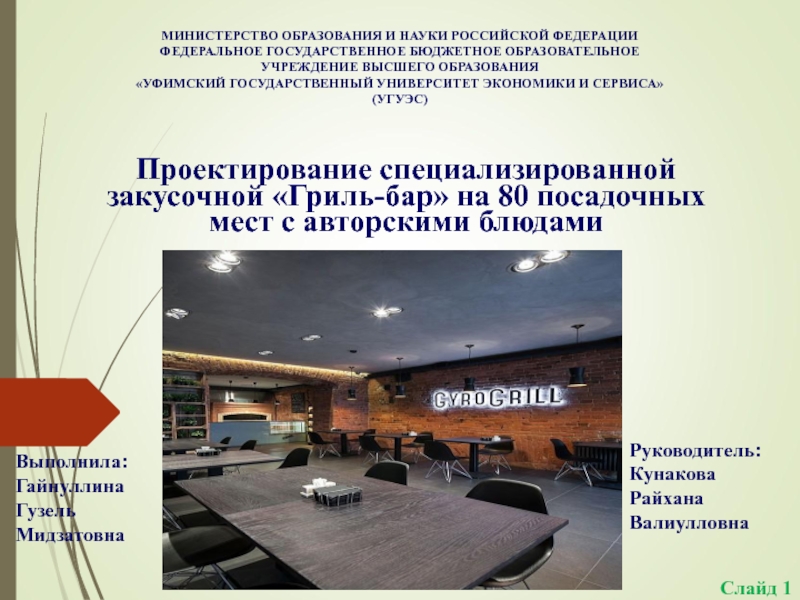Разделы презентаций
- Разное
- Английский язык
- Астрономия
- Алгебра
- Биология
- География
- Геометрия
- Детские презентации
- Информатика
- История
- Литература
- Математика
- Медицина
- Менеджмент
- Музыка
- МХК
- Немецкий язык
- ОБЖ
- Обществознание
- Окружающий мир
- Педагогика
- Русский язык
- Технология
- Физика
- Философия
- Химия
- Шаблоны, картинки для презентаций
- Экология
- Экономика
- Юриспруденция
Abu Bakr Mohammad Ibn Zakariya Al Razi Done by student : Elgendy el
Содержание
- 1. Abu Bakr Mohammad Ibn Zakariya Al Razi Done by student : Elgendy el
- 2. Слайд 2
- 3. Al-Rāzī, in full Abū Bakr Muḥammad ibn
- 4. One of the greatest names in medieval
- 5. Through translation, his medical works and ideas
- 6. Al-Rāzī’s two most significant medical works are
- 7. The philosophical writings of al-Rāzī were neglected
- 8. Smallpox vs. measlesRazi wrote:Smallpox appears when blood
- 9. MeningitisRazi compared the outcome of patients with
- 10. Ethics of medicineOn a professional level, Razi
- 11. Скачать презентанцию
Al-Rāzī, in full Abū Bakr Muḥammad ibn Zakariyyā al-Rāzī(born c. 854, Rayy, Persia —died 925), celebrated alchemist and Muslim philosopher who is also considered to have been the greatest physician of
Слайды и текст этой презентации
Слайд 3Al-Rāzī, in full Abū Bakr Muḥammad ibn Zakariyyā al-Rāzī
(born c.
854, Rayy, Persia —died 925), celebrated alchemist and Muslim philosopher
who is also considered to have been the greatest physician of the Islamic world.A comprehensive thinker, Razi made fundamental and enduring contributions to various fields, which he recorded in over 200 manuscripts, and is particularly remembered for numerous advances in medicine through his observations and discoveries.
An early proponent of experimental medicine, he became a successful doctor, and served as chief physician of Baghdad and Ray hospitals.
As a teacher of medicine, he attracted students of all backgrounds and interests and was said to be compassionate and devoted to the service of his patients, whether rich or poor.
Слайд 4One of the greatest names in medieval medicine is that
ofAbu Bakr Muhammad ibn Zakariya' al-Razi, who was born in
the Iranian City of Rayy in 865 (251 H) and died in the same town about 925 (312 H). A physician learned in philosophy as well as music and alchemy, he served at the Samanid court in Central Asia and headed hospitals in Rayy and Baghdad. A story is related that he was instrumental in determining the location in Baghdad of the hospital founded by `Adud al-Dawlah, for he is said to have chosen its position by hanging pieces of meat in various quarters of the city and finding the quarter in which the putrefaction of the meat was the slowest.Слайд 5Through translation, his medical works and ideas became known among
medieval European practitioners and profoundly influenced medical education in the
Latin West.Some volumes of his work Al-Mansuri, namely "On Surgery" and "A General Book on Therapy", became part of the medical curriculum in Western universities.
Edward Granville Browne considers him as probably the greatest and most original of all the Muslim physicians, and one of the most prolific as an author.
Additionally, he has been described as the father of pediatrics,and a pioneer of obstetrics and ophthalmology.
For example, he was the first to recognize the reaction of the eye's pupil to light.
Слайд 6Al-Rāzī’s two most significant medical works are the Kitāb al-Manṣūrī,
which he composed for the Rayy ruler Manṣūr ibn Isḥaq
and which became well known in the West in Gerard of Cremona’s 12th-century Latin translation, and Kitāb al-ḥāwī, the “Comprehensive Book,” in which he surveyed Greek, Syrian, and early Arabic medicine as well as some Indian medical knowledge.Throughout his works he added his own considered judgment and his own medical experience as commentary. Among his numerous minor medical treatises is the famed Treatise on the Small Pox and Measles, which was translated into Latin, Byzantine Greek, and various modern languages.
Слайд 7The philosophical writings of al-Rāzī were neglected for centuries, and
renewed appreciation of their importance did not occur until the
20th century. Although he claimed to be a follower of Plato, his views differed significantly from those of later Arabic interpreters of Plato such as al-Fārābī, Avicenna (Ibn Sīnā), and Averroës (Ibn Rushd). He was probably acquainted with Arabic translations of the Greek atomist philosopher Democritus and pursued a similar tendency in his own atomic theory of the composition of matter. Among his other works, The Spiritual Physick of Rhazes is a popular ethical treatise and a major alchemical study.Слайд 8Smallpox vs. measles
Razi wrote:
Smallpox appears when blood "boils" and is
infected, resulting in vapours being expelled. Thus juvenile blood (which
looks like wet extracts appearing on the skin) is being transformed into richer blood, having the color of mature wine. At this stage, smallpox shows up essentially as "bubbles found in wine" (as blisters)... this disease can also occur at other times (meaning: not only during childhood). The best thing to do during this first stage is to keep away from it, otherwise this disease might turn into an epidemic.Слайд 9Meningitis
Razi compared the outcome of patients with meningitis treated with
blood-letting with the outcome of those treated without it to
see if blood-letting could help.Pharmacy
Razi contributed in many ways to the early practice of pharmacy by compiling texts, in which he introduces the use of "mercurial ointments" and his development of apparatus such as mortars, flasks, spatulas and phials, which were used in pharmacies until the early twentieth century.
